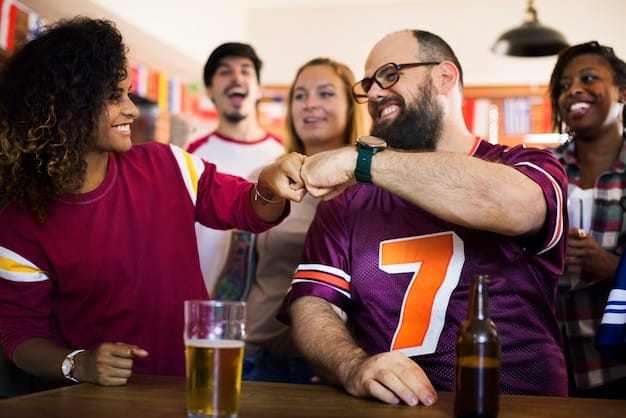LGBT LoL Pros: Strategies for Mental Health & Combating Harassment in 2025

In 2025, LGBT pro players in League of Legends are employing advanced strategies like AI-driven moderation, mental health advocacy through streaming, and community-led support networks to combat online harassment and maintain their well-being.
The landscape of professional gaming can be incredibly toxic, especially for marginalized communities. This article explores what are the latest strategies used by LGBT pro players in League of Legends to combat online harassment and maintain mental health in 2025, providing insights into their resilience and innovative approaches.
Understanding the Unique Challenges Faced by LGBT Pro Players
LGBT pro players in League of Legends face a unique set of challenges that extend beyond the typical pressures of competitive gaming. Understanding these challenges is the first step in addressing the online harassment and mental health issues they frequently encounter.
The intersection of being a professional gamer and identifying as LGBT can create a breeding ground for targeted harassment. From hateful comments to outright threats, the online abuse can take a significant toll on their mental well-being and professional performance.
The Prevalence of Online Harassment
Online harassment is rampant in the gaming community, but LGBT players often face a disproportionate amount due to their sexual orientation or gender identity. This harassment can manifest in various forms, including:
- Doxing: Revealing personal information online, such as addresses or phone numbers, with malicious intent.
- Swatting: Falsely reporting emergencies to trigger a police response at the player’s home.
- Hate Speech: Direct attacks based on sexual orientation or gender identity, often using slurs and derogatory language.
- Targeted Campaigns: Organized efforts to harass and silence LGBT players across multiple platforms.
Impact on Mental Health
The constant barrage of negativity and hate speech can have a devastating impact on the mental health of LGBT pro players. Common issues include:
- Anxiety and Depression: Constant exposure to harassment can lead to chronic anxiety and depression.
- Imposter Syndrome: Feeling as though they are not good enough or don’t deserve their success, amplified by the negative feedback.
- Burnout: The stress of dealing with harassment can lead to burnout and a diminished passion for the game.

Recognizing and addressing these unique challenges is critical in developing effective strategies to support LGBT pro players in maintaining their mental health and combating online harassment. Without proper support, the gaming community risks losing valuable talent and perpetuating a toxic environment.
AI-Driven Moderation and Automated Response Systems
One of the most significant advancements in combating online harassment has been the implementation of AI-driven moderation and automated response systems. These technologies offer real-time monitoring and rapid intervention to protect LGBT pro players from abuse.
AI-driven moderation systems use machine learning algorithms to detect and flag abusive language, hate speech, and other forms of harassment in real-time. This allows platforms to take immediate action, such as deleting offensive content, banning offenders, and providing support to the targeted player.
How AI Works in Moderation
AI moderation typically involves several key steps:
- Content Analysis: Analyzing text, images, and audio for signs of harassment using natural language processing (NLP) and image recognition.
- Real-time Monitoring: Continuously monitoring chat channels, social media feeds, and other online platforms for potential abuse.
- Automated Response: Triggering automated responses, such as deleting offensive comments or muting abusive users.
Benefits of Automated Response Systems
Automated response systems can provide immediate support to LGBT pro players by:
- Filtering Out Harassment: Automatically filtering out abusive messages and comments, reducing the player’s exposure to negativity.
- Providing Resources: Offering links to mental health resources or support groups.
- Alerting Human Moderators: Escalating severe cases to human moderators for further investigation and action.
AI-driven moderation and automated response systems are not a perfect solution, but they represent a significant step forward in creating a safer and more inclusive online environment for LGBT pro players. Continuous improvement and refinement of these technologies are essential to stay ahead of evolving forms of harassment.
Mental Health Advocacy Through Streaming and Content Creation
Many LGBT pro players are leveraging their platforms to advocate for mental health awareness and provide support to others facing similar challenges. Streaming and content creation have become powerful tools for sharing personal experiences, promoting positive mental health practices, and building supportive communities.
By sharing their own struggles and successes, LGBT pro players can help reduce the stigma surrounding mental health issues and encourage others to seek help when needed. This vulnerability and authenticity can create a strong connection with their audience, fostering a sense of community and belonging.
Creating Safe Spaces Online
LGBT pro players are actively creating safe spaces online through:
- Streaming: Using streaming platforms to host open and honest conversations about mental health and well-being.
- Content Creation: Producing videos, articles, and social media content that promotes self-care and mental health resources.
- Community Building: Fostering supportive communities where individuals can share their experiences and connect with others.
Collaborating with Mental Health Organizations
Many LGBT pro players are collaborating with mental health organizations to:
- Raise Awareness: Partnering with organizations to raise awareness about mental health issues within the gaming community.
- Provide Resources: Sharing information about available mental health resources and support services.
- Host Events: Organizing events and workshops focused on mental health and well-being.

Mental health advocacy through streaming and content creation is a proactive approach that empowers LGBT pro players to take control of their narrative and make a positive impact on the gaming community. By sharing their stories and promoting mental health awareness, they are helping to create a more supportive and inclusive environment for all.
Community-Led Support Networks and Safe Spaces
Community-led support networks and safe spaces are becoming increasingly important for LGBT pro players. These networks provide a sense of belonging, validation, and mutual support, helping players cope with online harassment and maintain their mental health.
These networks offer a safe haven where LGBT pro players can connect with others who understand their experiences, share their challenges and triumphs, and receive encouragement and support. This sense of community can be invaluable in combating feelings of isolation and loneliness.
The Role of Online Communities
Online communities play a critical role in:
- Providing Support: Offering emotional support and encouragement during difficult times.
- Sharing Resources: Sharing information about mental health resources, legal assistance, and other support services.
- Building Solidarity: Fostering a sense of solidarity and collective action against harassment and discrimination.
Creating Inclusive In-Game Environments
Efforts are being made to create more inclusive in-game environments through:
- Safe Chat Channels: Dedicated chat channels where LGBT players can communicate without fear of harassment.
- Anti-Harassment Policies: Implementing and enforcing strict anti-harassment policies within games and online communities.
- Community Moderation: Empowering community members to moderate chat channels and report abusive behavior.
Community-led support networks and safe spaces are essential for creating a more inclusive and supportive environment for LGBT pro players. By working together, these networks can help players navigate the challenges of online harassment and maintain their mental health.
Legal and Policy Interventions to Protect Players
While individual and community efforts are crucial, legal and policy interventions are also necessary to protect LGBT pro players from online harassment. These interventions involve working with gaming companies, law enforcement agencies, and government officials to create and enforce policies that address online abuse.
These interventions aim to hold perpetrators accountable for their actions, provide legal recourse for victims of harassment, and create a more deterrent environment for online abuse. By advocating for stronger laws and policies, LGBT pro players and their allies can help ensure that online harassment is taken seriously and that offenders are held responsible.
Working with Gaming Companies
Gaming companies can play a significant role by:
- Strengthening Anti-Harassment Policies: Implementing clear and comprehensive anti-harassment policies that specifically address abuse targeting LGBT players.
- Improving Reporting Mechanisms: Creating user-friendly reporting mechanisms that allow players to easily report harassment.
- Enforcing Consequences: Enforcing consequences for abusive behavior, such as banning offenders from the game.
Engaging with Law Enforcement
Engaging with law enforcement agencies involves:
- Reporting Cybercrimes: Reporting instances of doxing, swatting, and other cybercrimes to law enforcement for investigation.
- Advocating for Stronger Laws: Advocating for stronger laws that address online harassment and cyberstalking.
- Working with Prosecutors: Working with prosecutors to ensure that offenders are held accountable for their actions.
Legal and policy interventions are essential for creating a systemic change that protects LGBT pro players from online harassment. By working with gaming companies, law enforcement agencies, and government officials, these interventions can help create a safer and more accountable online environment.
The Role of Sponsors and Organizations in Promoting Mental Health
Sponsors and esports organizations are increasingly recognizing their responsibility to support the mental health of their players. This involves providing access to mental health resources, promoting mental health awareness, and creating a supportive team environment.
By prioritizing the mental health of their players, sponsors and organizations can help reduce the stigma surrounding mental health issues and create a culture of support and well-being. This can lead to improved player performance, increased job satisfaction, and a more positive and inclusive gaming community.
Providing Mental Health Resources
Sponsors and organizations can provide access to mental health resources by:
- Offering Therapy Services: Providing access to licensed therapists and counselors.
- Creating Wellness Programs: Implementing wellness programs that focus on stress management, mindfulness, and self-care.
- Providing Educational Materials: Sharing educational materials about mental health and well-being.
Promoting Supportive Team Environments
Creating supportive team environments involves:
- Fostering Open Communication: Encouraging open communication and creating a safe space for players to share their concerns.
- Promoting Team Building Activities: Organizing team building activities that promote camaraderie and mutual support.
- Providing Leadership Training: Providing leadership training to team managers and coaches to help them create a supportive and inclusive team environment.
The role of sponsors and organizations in promoting mental health is critical for creating a sustainable and supportive environment for LGBT pro players. By prioritizing mental health, these entities can help ensure that players are able to thrive both professionally and personally.
| Key Point | Brief Description |
|---|---|
| 🛡️ AI Moderation | AI identifies and filters harassment in real-time. |
| 🗣️ Streaming Advocacy | Players use streams to discuss mental health. |
| 🤝 Community Support | Networks provide safe spaces and resources. |
| ⚖️ Legal Interventions | Policies hold harassers accountable. |
FAQ
▼
AI-driven moderation uses machine learning to detect and filter abusive language and hate speech in real-time, protecting players from harassment.
▼
Streams serve as platforms for LGBT pro players to openly discuss mental health, reducing stigma and fostering supportive communities.
▼
Community networks provide safe spaces and resources for LGBT pro players, offering emotional support and a sense of belonging.
▼
Sponsors are increasingly providing mental health resources and promoting supportive team environments for their players’ well-being.
▼
Gaming companies and law enforcement are strengthening anti-harassment policies and reporting mechanisms to hold offenders accountable for online abuse.
Conclusion
In conclusion, 2025 sees LGBT pro players in League of Legends employing a multifaceted approach to combat online harassment and safeguard their mental health, combining technological solutions, community support, advocacy, and systemic interventions to foster a more inclusive and supportive gaming environment.





